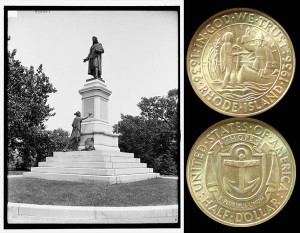Today, the Rhode Island Commemorative Silver Half Dollar Coin tells the story of the banishment of Roger Williams back in 1635, or was it 1634 or even 1636?
Historians cannot agree on the specific date that the Court of Massachusetts banished Roger Williams.
In Book Notes: Consisting of Literary Gossip, Criticisms of Books and Local Historical Matters Connected with Rhode Island, published in 1907, a summary tally compared the dates historians gave the historic event.
October 1635 — 11
year 1635 — 7
neither month nor year — 8
year 1636 — 1
November 3, 1635 — 6
September 3, 1635 — 5
latter part of 1635 — 1
3rd November, no year — 1
year 1635 — 6
8th October 1635 — 2
January 1636 — 1
19th October — 1
9th October 1635 — 2
September 2, 1635 —1
October 9-19 — 1
Regardless of the specific date, the Court of Massachusetts did banish Roger Williams.
In the Local Law in Massachusetts and Connecticut published in 1872, William Chauncey Fowler wrote of Roger Williams and his banishment from the Massachusetts Colony:
=====
This remarkable man arrived in Massachusetts in 1631, and after acting as a religious teacher in Salem, and for a period afterwards at Plymouth, and then returning to Salem, was banished in 1635, by the magistrates and general court, from the colony.
As he was a man of education, great moral worth, and supremely devoted to religion, and may be considered the founder of Rhode Island; the inquiry naturally comes up for an answer: Why did the general court banish Roger Williams?
The answer to that question may be found in the following statement, contained in the order of the general court.
“Sept. 3d, 1635. Whereas Mr. Roger Williams, one of the elders of the church of Salem, hath broached and divulged divers new and dangerous opinions against the authority of magistrates, as also writ letters of defamation both of the magistrates and churches here, and that before any conviction, and yet maintaineth the same without retraction, it is therefore ordered, that the said Mr. Williams shall depart out of this jurisdiction within six weeks now next ensuing; which if he neglect to perform, it shall be lawful for the governor and two of the magistrates to send him to some place out of this jurisdiction, not to return any more without license from the court.”
With this statement the following declaration of John Cotton agrees.
“Two things there were, which, to my best observation and remembrance, caused the sentence of his banishment, and two others fell in, that hastened it.”
As the first of these he specifies Williams’s “violent and tumultuous carriage against the patent,” the inestimable foundation, as he proceeds to show in some detail, of the privileges and property of the colonists.
As the second cause, he names the strictly political one, that “when the magistrates and other members of the general court, upon intelligence of some episcopal and malignant practice against the country, made an order of court to take trial of the fidelity of the people, not by imposing upon them, but by offering to them, an oath of fidelity, that, in case any should refuse to take it, they might not betrust them with place of public charge and command, this oath, when it came abroad, he vehemently withstood it, and dissuaded sundry from it, partly because it was, as he said, Christ’s prerogative to have his office established by oath, partly because an oath was a part of God’s worship, and God’s worship was not to be put upon carnal persons.”
The occasions which “hastened” the proceeding against him, Cotton represents to have been Williams’s appeal to the churches against the magistrates, and his renouncing communion with the church of Salem on account of its refusal to proceed with him in his disorganizing measures.
We here see, that the head and front of his offending was his opposition to some of the local laws of Massachusetts, which the general court were determined to defend, even by this act of banishment.
=====
The Rhode Island Commemorative Silver Half Dollar Coin shows beside an image of the statue of the man in the Roger Williams Park of Providence, Rhode Island.
